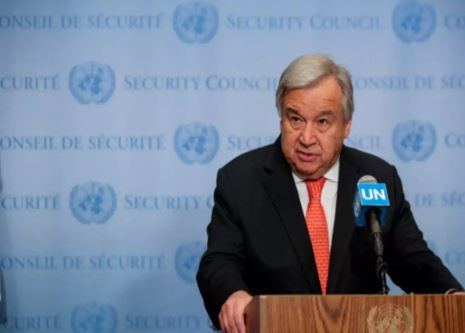United Nations: India has strongly expressed its disappointment over UN chief Antonio Guterres, in his recent report, including situations in India that are neither armed conflicts nor a threat to international security, saying such attempt to expand mandate in a selective manner to certain situations only politicises the agenda.
In the ‘Annual Report of the Secretary-General on Children and Armed Conflict’, which was released on Tuesday, Guterres said children continued to be affected by incidents of violence between armed groups and the Government, “particularly in Jammu and Kashmir and in the context of the Naxalite insurgency.”
India was mentioned under a section of the report titled Situations not on the agenda of the Security Council or other situations.
Paulomi Tripathi, India’s first secretary at the United Nations General Assembly, speaking at a Security Council open debate on Children and Armed Conflict on Friday, pointed to the importance of credible, impartial and transparent implementation of the mandate given to the UN system.
In spite of the clear mandate by the Council, we are disappointed that the Report of the Secretary-General includes situations which are not armed conflicts or of threat to maintenance of international peace and security, she said.
Such attempt to expand mandate in a selective manner to certain situations only politicizes and instrumentalises the agenda, obfuscating and diverting attention from the real threats to international peace and security, she said.
The report noted that the UN received reports of child recruitment and use in Jammu and Kashmir.
Five children, some as young as 14, were reportedly recruited by militant groups, including by Hizbul Mujahideen (two) and Ansar Ghazwat-ul-Hind (one), the report stated.
Two other children joined Lashkar-e-Taiba and were reportedly killed in an encounter with the government forces on December 9.
In addition, reports of the systematic recruitment of children by Naxalites continued to be received,” the report said.
The report also cited the rape and murder of an 8-year-old girl in Kathua district.
Guterres, however, welcomed the measures taken by the Indian government to ensure protection to children.
Tripathi said India is cognizant of the urgency to act now to protect today’s child victims in order to prevent tomorrow’s armed conflicts and New Delhi remains a committed partner of the UN in this endeavour.
Leading human rights organisations also criticized Guterres for omitting countries responsible for grave violations against children in armed conflict in his new list of shame, saying the process for determining which perpetrators are included in the report has become increasingly politicized.
Watchlist on Children and Armed Conflict, a New York-based coalition of NGOs, said that in recent years, the process for determining which perpetrators are included in the report has become increasingly politicized.
Jo Becker, children’s rights advocacy director at Human Rights Watch, said, the UN secretary-general simply refuses to hold to account all warring parties that have inflicted tremendous suffering on children.
By listing selected violators but not others, Secretary-General Guterres is ignoring the UN’s own evidence and undermining efforts to protect children in conflict, Becker said.
Tripathi stressed that as the scale and severity of grave violations perpetrated against children remain on the rise, it is clear that there are significant challenges to effective implementation of this mandate.
Grave violations continue to be perpetrated by a range of actors in complex situations of armed conflicts. Terrorist networks and other non-state actors continue to exploit children for their own nefarious ends. In some situations the nexus between the state machineries and the non-state actors pose complex challenges, she said.
The impunity of all such actors must be ended through resolute action by governments from whose territory such entities operate, she added.
Tripathi also underscored that the international forces operating in areas of armed conflict must ensure full compliance with international humanitarian law and relevant human rights law in all their responses.
Further, nations must focus on consolidating the emerging positive trends in terms of parties to armed conflicts engaging more with the UN and releasing and reintegrating children recruited by different parties, she said. (PTI)





